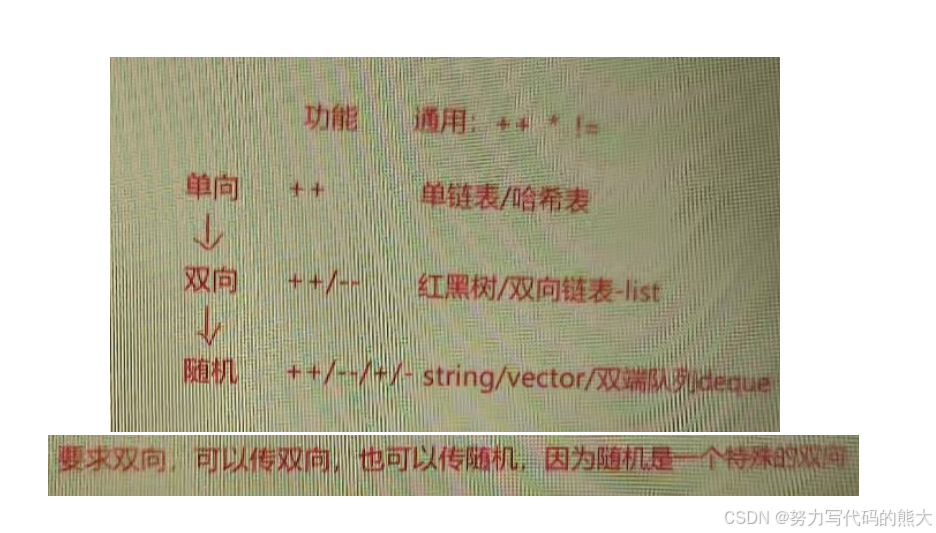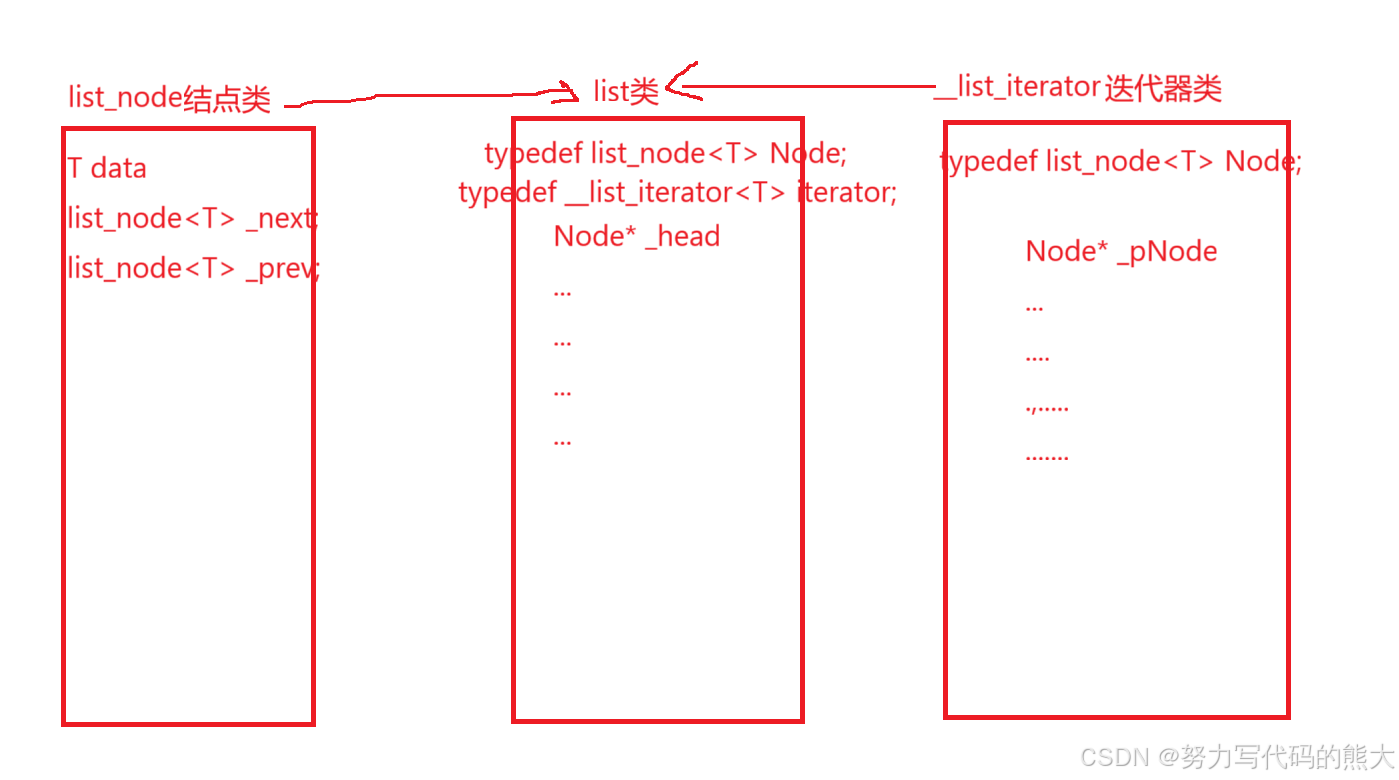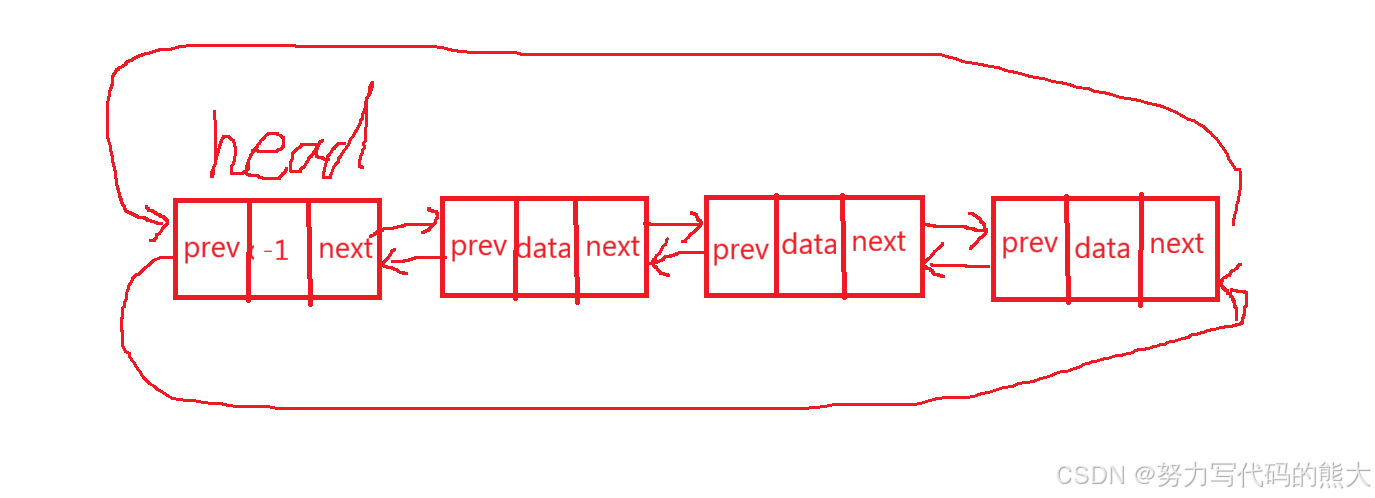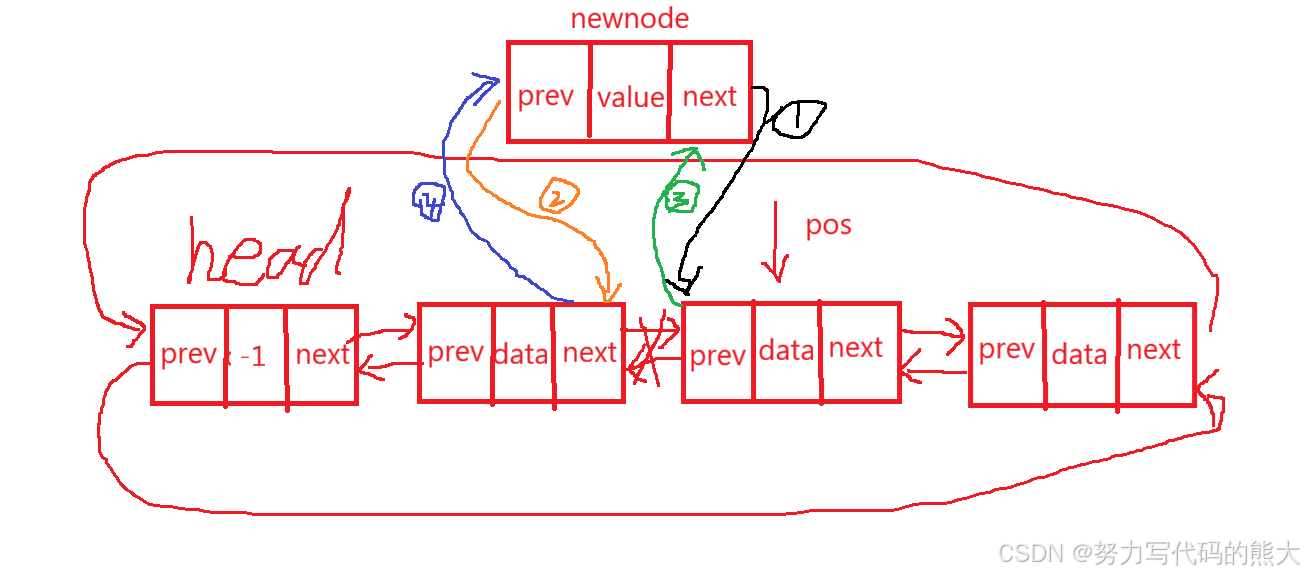单向、双向、随机迭代器
算法对迭代器是有要求的,算法迭代器名字就是要求。
迭代器通用的功能++/*(解引用)/!=这几个基本组成。
**需要单向迭代器的算法,则在这个算法加入的迭代器就必须是大于单向迭代器的功能的(也就是说后面的迭代器都支持前面迭代器的功能,这里体现了向前兼容特点,也更好的解偶)**如果是数据结构stl迭代器是双向迭代器是实现不了随机的功能的,这也导致了有时候使用迭代器时候用不了+ -迭代,这就是因为双向迭代器不支持+,-这些运算符重载。双向迭代器不能支持+-操作,一般能实现的只有随机迭代器(解决办法就是在调用之前使用一个变量存储迭代器然后++\--操作达到想要的指向地址)
list内部的sort算法,如果数据量小,就用,数据量大,用别人的。因为算法库里面的sort是随机迭代器,比list大,所以有些操作不能支持,所以这里需要写sort调用list自己的sort。
list的模拟

结点
双向链表的结点和我们在数据结构中双向链表是一样的。
cpp
//链表结点
template<class T>
class list_node
{
T data; //数据内容
list_node* next;//指向下一个结点
list_node* prev;//指向上一个结点
//构造
list_node(const T& value)
:data(value)
,next(nullptr)
,prev(nullptr)
{}
};迭代器
cpp
//迭代器
template<class T,class Ref,class Ptr>
struct __list_iterator
{
typedef list_node<T> Node;
typedef __list_iterator<T, Ref, Ptr> Self;
Node* _pNode;
//构造
__list_iterator(Node* pNode = nullptr)
:_pNode(pNode)
{}
//*解引用访问数据
Ref operator*()//使用引用是为了方便修改数据
{
return _pNode->_data;
}
//->运算符重载
Ptr operator->()
{
return &(_pNode->_data);
}
//++运算符重载
Self& operator++()
{
_pNode = _pNode->_next;
return *this;
}
//后置++
Self operator++(int)
{
Self tmp(*this);
_pNode = _pNode->_next;
return tmp;
}
//--运算符重载
Self& operator--()
{
_pNode = _pNode->_prev;
return *this;
}
//后置--
Self operator--(int)
{
Self tmp(*this);//拷贝值(浅拷贝)
_pNode = _pNode->_prev;
return tmp;
}
//!=运算符重载
bool operator!=(const Self& l)const
{
return _pNode == l._pNode;
}
//==运算符重载
bool operator == (const Self& l)const
{
return _pNode == l._pNode;
}
};插入

cpp
iterator insert(iterator pos, const T& value)
{
Node* newnode = new Node(value);
Node* cur = pos._pNode;
Node* prev = pos._pNode->_prev;
//newnode
newnode->_next = cur;
newnode->_prev = prev;
//prev cur
prev->_next = newnode;
cur->_prev = newnode;
++_size;
return newnode;
}删除
cpp
//删除
iterator erase(iterator pos)
{
Node* next = pos._pNode->_next;
Node* prev = pos._pNode->_prev;
prev->_next = next;
next->_prev = prev;
delete pos._pNode;
pos._pNode = nullptr;
--_size;
return next;
}empty
cpp
//empty
bool empty()
{
return _size == 0;
}size
cpp
//size
size_t size()
{
return _size;
}获取头部元素
cpp
//获取首元素
T& front()const
{
return _head->_next->_data;
}获取尾部元素
cpp
//获取尾部元素
T& back()const
{
return _head->_prev->_data;
}尾插尾删
cpp
//尾插
void push_back(const T& value)
{
insert(end(), value);//这里不用前置--,insert在设计的时候就是在pos位置之前插入
}
//尾删
void pop_back()
{
erase(--end());
}这里为了避免大家翻上面代码,我这里把insert和erase的代码放在下面
insert
cpp
//插入
iterator insert(iterator pos, const T& value)
{
Node* newnode = new Node(value);
Node* cur = pos._pNode;
Node* prev = pos._pNode->_prev;
//newnode
newnode->_next = cur;
newnode->_prev = prev;
//prev cur
prev->_next = newnode;
cur->_prev = newnode;
++_size;
return newnode;
}erase
cpp
//删除
iterator erase(iterator pos)
{
Node* next = pos._pNode->_next;
Node* prev = pos._pNode->_prev;
prev->_next = next;
next->_prev = prev;
delete pos._pNode;
pos._pNode = nullptr;
--_size;
return next;
}头插头删
cpp
//头插
void push_front(const T& value)
{
insert(begin(), value);
}
//头删
void pop_front()
{
erase(begin());
}clear
cpp
//clear
void clear()
{
iterator it = begin();
while (it != end())
{
it = erase(it);
}
}swap
cpp
//swap
void swap(list<T>& l)
{
std::swap(_head, l._head);
std::swap(_size, l._size);
}拷贝
cpp
//拷贝
list(const list<T>& l)
{
_head = new Node;
_head->_next = _head;
_head->_prev = _head;
for (auto& e : l)
{
push_back(e);
}
}赋值
cpp
//赋值
list<T>& operator=(const list<T>& l)
{
//_head = l._head;
//_size = l._size;
//return *this;
if(this != &l)
{
clear();
list<T> tmp(l);
swap(tmp);
}
return *this;
}完整代码
cpp
#pragma once
#include<iostream>
using namespace std;
namespace bear
{
//链表结点
template<class T>
struct list_node
{
T _data; //数据内容
list_node<T>* _next;//指向下一个结点
list_node<T>* _prev;//指向上一个结点
//构造
list_node(const T& value = T())
:_data(value)
,_next(nullptr)
,_prev(nullptr)
{}
};
//迭代器
template<class T,class Ref,class Ptr>
struct __list_iterator
{
typedef list_node<T> Node;
typedef __list_iterator<T, Ref, Ptr> Self;
Node* _pNode;
//构造
__list_iterator(Node* pNode)
:_pNode(pNode)
{}
//*解引用访问数据
Ref operator*()//使用引用是为了方便修改数据
{
return _pNode->_data;
}
//->运算符重载
Ptr operator->()
{
return &(_pNode->_data);
}
//++运算符重载
Self& operator++()
{
_pNode = _pNode->_next;
return *this;
}
//后置++
Self operator++(int)
{
Self tmp(*this);
_pNode = _pNode->_next;
return tmp;
}
//--运算符重载
Self& operator--()
{
_pNode = _pNode->_prev;
return *this;
}
//后置--
Self operator--(int)
{
Self tmp(*this);//拷贝值(浅拷贝)
_pNode = _pNode->_prev;
return tmp;
}
//!=运算符重载
bool operator!=(const Self& l)const
{
return _pNode != l._pNode;
}
//==运算符重载
bool operator == (const Self& l)const
{
return _pNode == l._pNode;
}
};
template<class T>
class list
{
public:
typedef list_node<T> Node;
typedef __list_iterator<T, T&, T*> iterator;
typedef __list_iterator<T, const T&, const T*> const_iterator;
//迭代器
iterator begin()
{
return iterator(_head->_next);
}
iterator end()
{
return iterator(_head);
}
const_iterator begin()const
{
return const_iterator(_head->_next);
}
const_iterator end()const
{
return const_iterator(_head);
}
//构造
list()
{
_head = new Node;
_head->_next = _head;
_head->_prev = _head;
}
//拷贝
list(const list<T>& l)
{
_head = new Node;
_head->_next = _head;
_head->_prev = _head;
for (auto& e : l)
{
push_back(e);
}
}
//赋值
list<T>& operator=(const list<T>& l)
{
//_head = l._head;
//_size = l._size;
//return *this;
if(this != &l)
{
clear();
list<T> tmp(l);
swap(tmp);
}
return *this;
}
//析构
~list()
{
clear();
delete _head;
_head = nullptr;
}
//插入
iterator insert(iterator pos, const T& value)
{
Node* newnode = new Node(value);
Node* cur = pos._pNode;
Node* prev = pos._pNode->_prev;
//newnode
newnode->_next = cur;
newnode->_prev = prev;
//prev cur
prev->_next = newnode;
cur->_prev = newnode;
++_size;
return newnode;
}
//删除
iterator erase(iterator pos)
{
Node* next = pos._pNode->_next;
Node* prev = pos._pNode->_prev;
prev->_next = next;
next->_prev = prev;
delete pos._pNode;
pos._pNode = nullptr;
--_size;
return next;
}
//empty
bool empty()const
{
return _size == 0;
}
//size
size_t size()const
{
return _size;
}
//获取首元素
T& front()const
{
return _head->_next->_data;
}
//获取尾部元素
T& back()const
{
return _head->_prev->_data;
}
//尾插
void push_back(const T& value)
{
insert(end(), value);
}
//尾删
void pop_back()
{
erase(--end());
}
//头插
void push_front(const T& value)
{
insert(begin(), value);
}
//头删
void pop_front()
{
erase(begin());
}
//clear
void clear()
{
iterator it = begin();
while (it != end())
{
it = erase(it);
}
}
//swap
void swap(list<T>& l)
{
std::swap(_head, l._head);
std::swap(_size, l._size);
}
private:
Node* _head;
size_t _size = 0;
};
}